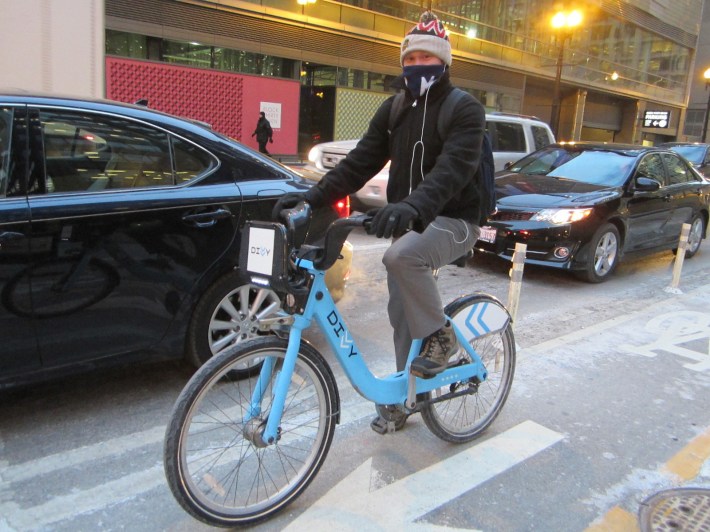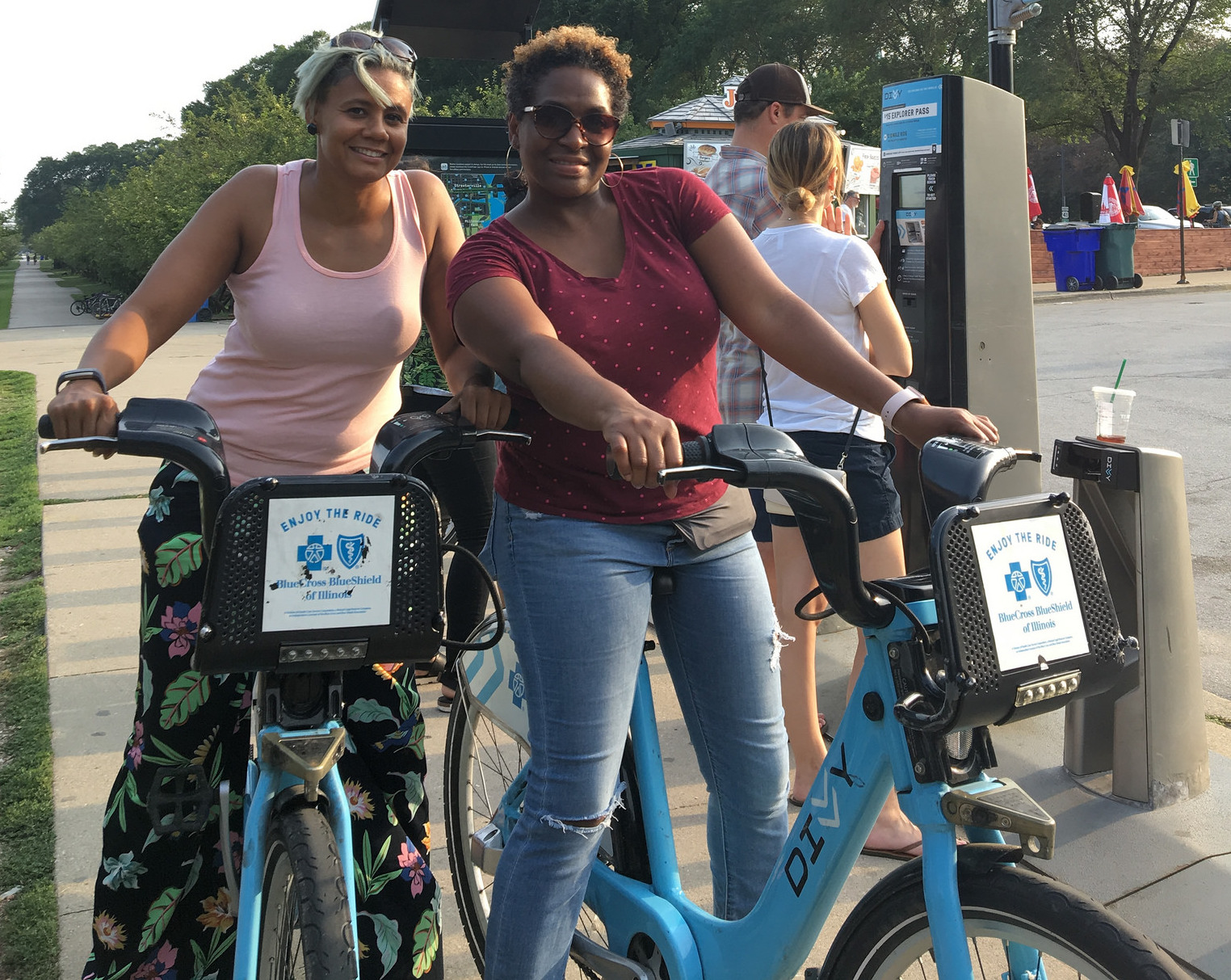[A version of this article previously ran in the Chicago Reader. Streetsblog's Lynda Lopez helped out with research.]
Divvy's future wasn't looking so bright a year ago, when the city of Chicago acknowledged it had seen a major drop in income from the bike-share system in 2106, after its expansion further into the south and west sides. But numbers I recently obtained from the Chicago Department of Transportation via a Freedom of Information Act request paint a much rosier picture, showing that 2017 was the city’s most lucrative year ever for Divvy revenue.
Chicago launched Divvy in 2013 and owns the bikes and docking stations. The New York-based company Motivate, which was purchased by Lyft this summer, is contracted by the city to run the system. The city makes most of its profits from Divvy via advertising revenue and a sponsorship deal with Blue Cross Blue Shield of Illinois, which includes displaying the insurance company’s logo on the bikes. While the city gets to keep all of the ad and sponsorship revenue, it splits any profits or loss from running the system with Motivate.
Each year CDOT approves an operations budget to pay the Divvy concessionaire for running the system, bankrolled by income from bike-share memberships, day passes, and late fees, according to department officials. Per the contract, Motivate has to cover any operations funding shortfall equal to 10 percent of approved budget expenses for the year.
For example, if $9 million is budgeted for annual operations, but revenue from memberships, passes, and fees doesn’t wind up covering the year’s operating expenses, Motivate is responsible for the first $900,000 in losses, but the city has to cover the rest of the shortfall, CDOT officials said.
On the other hand, if operating revenue exceeds expenses, Motivate gets up to 70 percent of that profit, based on the company’s performance, according to CDOT. That’s only happened once, in 2015, when Divvy turned a modest operational profit of $45,849.
CDOT uses income from Divvy to purchase more docking stations and bikes -- this fall the department has been installing a new batch of 36 stations. The revenue also funds the department's Bicycling Ambassadors outreach team and its Vision Zero crash prevention program, plus bike lanes and pedestrian safety infrastructure.
In December 2017 the Chicago Tribune reported that the city’s net revenue from Divvy fell from $2.86 million in 2014 and $2.84 million in 2015 to $1.97 million in 2016, a 31 percent decline.
That discouraging bottom line was caused by a spike in operating expenses, from $6,682,067 in 2015 to $9,322,881 in 2016, a 40 percent increase. CDOT officials said at the time that this was mainly due to the challenges of managing a larger service area and fleet after the system expanded from 300 stations and 3,000 bikes in 2014 to 580 stations and 5,800 bikes by late 2016.
In the early years, Divvy stations were concentrated downtown and in affluent north side neighborhoods. So to make the system more equitable, many of the new stations were installed in lower-income African-American and Latinx communities on the south and west sides. Ridership was relatively low in these areas due to factors such as the cost of membership, the relative scarcity of bike lanes, and the greater distances between destinations and Divvy stations, which makes bike-share less convenient to use.
As a result, operations costs grew. In 2016 Divvy saw its worst-ever operations loss (the cost of running the system subtracted from the income generated by annual memberships, day passes, and late fees): a whopping $1,756,420. Per the terms of CDOT's contract with Motivate, the bike-share concessionaire, the city had to pay a full $752,011 to cover its share of that red ink.
However, thanks to the $1,146,220 Chicago earned in station advertising in 2016, plus the $2,250,000 it took in from its Blue Cross Blue Shield sponsorship that year -- neither of which were shared with Motivate -- the city still turned the overall profit of $1.97 million.
The good news revealed in the recently FOIAed numbers is that Chicago’s net income from Divvy ballooned by 72 percent in 2017, to $3.37 million. That's the largest profit the system has ever seen, which offers hope for its longterm viability. So what explains that good fortune?

For starters, the city’s income from ads and the Blue Cross sponsorship was higher than ever last year, $1,343,942 and $2,340,000, respectively. "2017 was really successful for us for advertising," said CDOT assistant commissioner Sean Wiedel, who oversees Divvy. "We really think the association with the Divvy brand is a positive one for advertisers." And, since the sponsorship contract stipulates that Chicago gets a larger payment from Blue Cross each year, the city received an additional $90,000 from Blue Cross in 2017.
Operations income (from memberships, passes, and fees) was also at its highest-ever rate in 2017, at $7,958,472. Wiedel said this was partly due to the fact that 3,836,905 trips were taken on bike-share last year, more than any previous year and about 270,000 higher than the 2016 total. He also noted improvements to Divvy's strategy for "rebalancing,” the practice of redistributing bikes to parts of town where they're needed.
The combined income from ads, sponsorship, and operations revenue last year was $11,642,414.
Meanwhile Divvy's 2017 operational loss was $1,291,428, which was $464,992 less than the $1,756,420 lost in operations the previous year. Due to the terms of the contract with Motivate, the city was responsible for a smaller percentage of that loss in 2017—only $311,708, or less than half as much as in 2016. (Motivate’s share of the operations losses was roughly a million dollars each year.) All of these factors added up to the city's record-breaking $3.37 million profit from the Divvy program last year.
Still, low Divvy ridership on the south and west sides continued to be a problem in 2017. According to CDOT records, most of the stations with below-average ridership were in these parts of town. Some of the ridership numbers were downright pathetic: while the busiest Divvy station, by Navy Pier, saw 50,860 trips last year, the bottom 25 stations -- all of them in lower-income communities of color -- saw a combined total of 282 trips, or about 11 trips per station for the entire year.
CDOT has been trying to address the Divvy gap by offering $5 Divvy for Everyone memberships to low-income Chicagoans. Roughly 5,000 people have signed up since summer 2015, and there are currently about 2,000 active members, according to Wiedel. Divvy has hired a handful of outreach workers to spread the word about the program.
But Active Transportation Alliance spokesman Kyle Whitehead said that in order to further boost Divvy use, CDOT should take action to calm traffic in underserved neighborhoods and build more protected bike lanes in these areas. "City leaders need to do more to address other barriers to bicycling in these communities," he said, referring to the south and west sides of the city. "Adding Divvy stations by itself is not enough to get more people riding in areas that are built around cars."
While Divvy had a good year in 2017, it's not clear what its bottom line will look like for 2018. After all, this was the year that the system saw a wave of bike thefts, which were the result of the short-sighted decision to remove a small but critical piece of security hardware from the docks. City emails obtained via a public records request indicate that over 500 cycles have gone missing. Per the contract with Motivate, the city is only required to pay for 60 of those bikes, a $72,000 expense. Wiedel told me the security hardware is on track to be reinstalled in all of the stations by the end of November, which should solve the theft problem.
Wiedel noted that ridership has been solid in 2018, with 3,439,237 Divvy trips logged as of November 8. That means the system is on track to rack up roughly the same number of rides as last year, 3,836,905, by New Year’s Day, even when you factor in the drop-off in bike-share use as the weather grows colder, he said.
Another positive recent development, from an equity standpoint, is Mayor Rahm Emanuel's recent announcement that he plans to use part of a $2.5 million climate change grant from the Michael Bloomberg Foundation to help bring bike-share to the rest of the city. That may not help the system's bottom line, but for residents of outlying neighborhoods who have been waiting more than five years for Divvy, that final expansion is way overdue.





